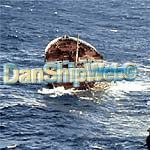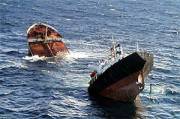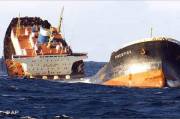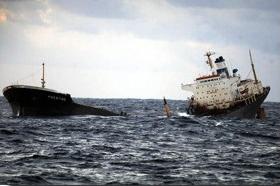| DanShipWeb©-"do it the easy way"
Break' em or the sea will take'
em
|
| |
| Welcome To DanShipWeb
Introduction
For many years now the shipping industry has been expanding with new tonnage over the full range of vessel types, especially passanger/cruise tanker and container vessels have now virtualy become the norm for transportation across the seas.
Expansion of new tonnage will not necessarly mean, that the world's aging fleet will be scrapped, on the contrary shipping disasters have become more frequent.
Ship losses in the world: - 94 % of ships lossed are more than 15 years old.
The principal regulations governing maritime safety
The following are the major international shipping conventions, adopted by the International Maritime Organization (IMO), the International Labour Organization (ILO) and the European Union, concerning safety and pollution prevention. However, many other maritime instruments or regulations concerning more specific issues are also in force worldwide.
The ship
SOLAS (International Convention for the Safety of Life at Sea, 1974) lays down a comprehensive range of minimum standards for the safe construction of ships and the basic safety equipment (e.g. fire protection, navigation, lifesaving and radio) to be carried on board. SOLAS also requires regular ship surveys and the issue by flag states of certificates of compliance.
MARPOL (International Convention for the Prevention of Pollution from Ships, 1973/1978) contains requirements to prevent pollution that may be caused both accidentally and in the course of routine operations. MARPOL concerns the prevention of pollution from oil, bulk chemicals, dangerous goods, sewage, garbage and atmospheric pollution, and includes provisions such as those which require certain oil tankers to have double hulls.
COLREG (Convention on the International Regulations for Preventing Collisions at Sea, 1972) lays down the basic "rules of the road", such as rights of way and actions to avoid collisions.
LOADLINE (International Convention on Loadlines) sets the minimum permissible free board, according to the season of the year and the ship's trading pattern.
ISPS (The International Ship and Port Facility Security Code, 2002) includes mandatory requirements to ensure ships and port facilities are secure at all stages during a voyage.
The Oceans and Seas
Jurisdiction over the oceans (United Nations Convention on the Law of the Sea. The Convention came into force on 16 November 1994) Navigational rights, territorial sea limits, economic jurisdiction, legal status of resources on the seabed beyond the limits of national jurisdiction, passage of ships through narrow straits, conservation and management of living marine resources, protection of the marine environment, a marine research regime and, a more unique feature, a binding procedure for settlement of disputes between States.
The Shipping Company
ISM (The International Safety Management Code, 1993) effectively requires shipping companies to have a licence to operate. Companies and their ships must undergo regular audits to ensure that a safety management system is in place, including adequate procedures and lines of communication between ships and their managers ashore.
The Seafarer
STCW (International Convention on Standards of Training, Certification and Watchkeeping for Seafarers, 1978/1995) establishes uniform standards of competence for seafarers.
ILO 147 (The ILO Merchant Shipping (Minimum Standards) Convention, 1976) requires national administrations to have effective legislation on labour issues such as hours of work, medical fitness and seafarers' working conditions.
The European Union
Council Directive 95/21/EC of 19 June 1995 concerning the enforcement, in respect of shipping using european Community ports and sailing in the waters under the jurisdiction of the Member States, of international standards for ship safety, pollution prevention and shipboard living and working conditions (port State control).
|















